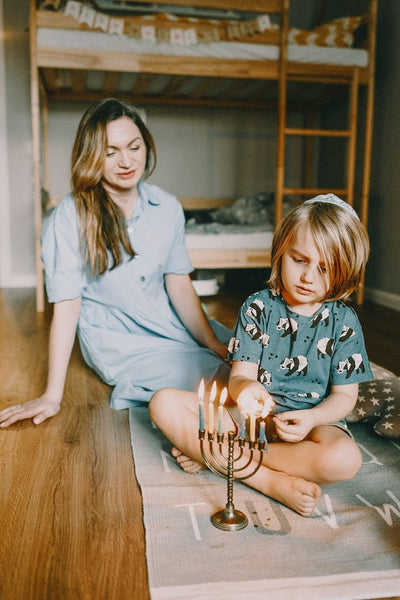Why Creating Meaningful Holiday Traditions with Your Kids is So Important

Updated: 25 Nov 2024
Holidays are a festive, joyous time for many families, especially when children are in the picture. Parents and children mark the occasion in a variety of special ways. Being part of these holiday rituals helps kids grow and develop into loving, imaginative, and thoughtful adults. Whether it’s enjoying fireworks for Diwali, eating lakes during Hannukah, or choosing a Christmas tree together, holiday traditions around the world can help children feel more connected to the event and the special time of year. Let’s take a closer look at how to create meaningful traditions and how these rituals foster their mental and emotional development.
Mary Meyer Putty Nursery Soft Stuffed Toy, Blizzard Snowman dons a stitched-on, top hat, and striped scarf. He has beans in the bum and etched super-luxe fabric. This toy has durable plastic eyes that are sonic-welded in place and surpass all required safety standards for ages zero and up.

Mary Meyer Putty Nursery Soft Stuffed Toy, Blizzard Snowman
Why Creating Holiday Traditions Matters
Thoughtfully established holiday traditions can promote a child’s mental and emotional development and help connect them to their family. They create lifelong memories that are added upon each year, building bonds and reinforcing secure attachments. Creating meaningful holiday traditions has a number of other developmental benefits for kids.
Provides reassurance and predictability
The holiday season, though joyful, is also a time filled with a lot of extra stimulation for children. The noise, the lights, and a houseful of relatives your child doesn’t see on a regular basis can be a bit overwhelming. For children who thrive on routine and predictability (as many do), family traditions can be a touchstone amidst the chaos for kids and help them anticipate what’s coming next.
Builds family and cultural connections
Traditions form the structure and foundation of our families and our society. Studies show that cultural appreciation and awareness contribute to building a positive self-image. Developing a strong foundation of belonging and acceptance through cultural education and celebration allows children to build a diverse social network while transitioning into adulthood. When children feel this connection between their family and holiday traditions, they can appreciate the festivities even more.
Fosters their imagination and encourages critical thinking
For very young children, some traditions can be confusing. Many of the traditional holiday rituals, like Santa Claus and the Hanukkah story about the oil lasting eight nights, require children to suspend disbelief and welcome the seemingly impossible. Doing so can actually benefit their mental development and flexible thinking. Traditions that involve fantastical elements can help children begin to understand symbolism, encourage imagination, and promote analogical reasoning. Experts suggest sharing holiday stories with your child, talking about what it represents, and encouraging kids to talk about their thoughts and feelings about it.
One essential aspect of creating meaningful traditions is being respectful toward your child’s feelings and engaging in discussion with them. Have a conversation about your family’s rituals and ask your child their thoughts about it. Help them feel comfortable expressing their feelings. As a caregiver, you are your child’s most trusted source of information about the world and culture around them. Ultimately, holiday traditions should help kids feel more connected and strengthen the meaning of the holiday, whether that’s love, giving, being together, gratitude, or something else.
As children step out into the world and explore all the beautiful things it has to offer, Honey Bear reminds children to appreciate every bit of it. Slumberkins Honey Bear Kin, Gratitude, Honey is the perfect size for children to carry with them as they develop a sense of imaginative play. Honey Bear helps children learn to cultivate gratitude and bring awareness of the things in their everyday lives that they can be grateful for having.

Slumberkins Honey Bear Kin, Gratitude, Honey
Ideas for Creating Meaningful Holiday Traditions
Many families have in America winter holiday traditions that have been passed down from previous generations or that they enjoyed as children. You can also establish your own traditions – there are many ideas! Here are a few family-friendly activities and rituals that will foster your child’s development:
- Decorating the house
- Creating and mailing holiday cards
- Volunteering your time or donating food, toys, or clothing
- Having an advent calendar
- Take a family photo
- Decorating the Christmas tree
- Lighting the menorah for Hanukkah or the Mishumaa Saba for Kwanzaa
- Sharing stories of family history
- Reading a holiday book every night of the season
- Spending time together outdoors
- Singing holiday songs together
- Spending time with loved ones
- Preparing a holiday meal or baking treats together

With The Artisanal Kitchen: Jewish Holiday Baking, you can bake your way through the Jewish holidays with 25 insanely delicious, foolproof recipes—including Poppy Seed Hamantaschen for Purim, Coconut Macaroons for Passover, Apple Babka for Rosh Hashanah, jam-filled Sufganiyot for Hanukkah, and so much more. These dishes from master baker Uri Scheft, author of Breaking Breads, capture the Old World/New World/out-of-this-world flavors of contemporary Jewish and Israeli cuisine.

The Artisanal Kitchen: Jewish Holiday Baking
The Bottom Line on Creating Meaningful Holiday Traditions With Children
Holiday traditions play an important role in helping young children build self-esteem and develop a positive sense of identity. In a season that can be so hectic and overwhelming, establishing meaningful holiday traditions can make your home a haven of warmth and comfort. Your children probably won't remember how many presents they receive during the holidays, but they will remember the traditions and quality time they spent with you and their most cherished friends and family.










